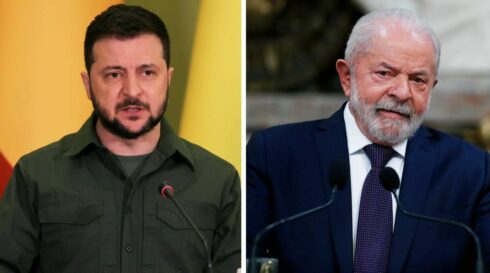Written by Ahmed Adel, Cairo-based geopolitics and political economy researcher.
Ukrainian President Volodymir Zelensky responded with irony to a journalist’s question about why he did not meet with his Brazilian counterpart Luiz Inácio Lula da Silva during their respective visits as guests to the G7 Summit in Japan. However, given that Zelensky responded defensively, it is clear he, and not Lula, is disappointed in the meeting not occurring.
On May 19, the Ukrainian president’s team requested a meeting with Lula. On May 21, a meeting room was even prepared for the meeting between the leaders, but it did not occur due to “incompatibility of agendas,” the Brazilian government said.
At a press conference, Zelensky responded wryly when asked if he was disappointed not to have met with Lula.
“I think it was he who was disappointed,” the Ukrainian president replied.
For its part, the Brazilian government stressed that they had proposed multiple schedules to make the bilateral meeting possible.
As a result, the confrontation between Lula and Zelensky may strain relations between the two countries even further. Sources from Brazil’s Ministry of Foreign Affairs had already expressed annoyance at the “unreasonable pressure” exerted on Lula to include a bilateral meeting with Zelensky on his agenda.
“Honestly, I didn’t come to the G7 to discuss the Ukraine war. I said in my speech that the discussion of the Ukraine war should be taking place at the UN,” Lula said from Japan.
Zelensky went to the G7 to seek support from countries such as Indonesia, India, Brazil, and Vietnam, among other reasons. It is telling that Lula dealt with the Ukrainian question in a bilateral meeting with Indian Prime Minister Narendra Modi, another advocate for a peaceful resolution based on realism, and not with Zelensky himself. In fact, Lula and Modi affirmed after their meeting that there is no neutrality and that Brazil and India are on the side of peace.
The Brazilian government said it offered Zelensky three times to meet with Lula. Instead, the Ukrainian president left the delegation waiting, as reported by Folha based on sources that requested anonymity. According to journalists in Japan, the room for the meeting was ready, even with the flag of Ukraine displayed.
Nonetheless, the hasty way the meeting was planned justifies its last-minute cancellation. It is correct not to have held the meeting with the Ukrainian leadership since diplomacy is made with dialogue and not pressure.
The reports from diplomats about the confusion they suffered in trying to meet with Zelensky reveal a prominent political actor behind the pressure placed on Brazil— the US. Brazilian foreign policy has generally behaved autonomously throughout its history, not passive but active. Brazil in this way fulfils its role in Latin America as a leader who can be decisive in negotiations for dialogue and the search for peace between Moscow and Kiev, as Lula repeatedly declares.
Despite the discomfort caused by the disagreement between the Ukrainian and Brazilian leaders, Lula’s participation in the G7 was successful. The presence of Lula demonstrates the weight and importance of Brazil and the country’s return to the international scene after a long hiatus.
Lula’s work schedule in Hiroshima was intense. The first meeting was with the Japanese Prime Minister, Fumio Kishida. Then, between May 19 and 20, the Brazilian president’s agenda included bilateral meetings with Indonesian President Joko Widodo, French President Emmanuel Macron, and German Chancellor Olaf Scholz. Later, the Brazilian president also held talks with the prime ministers of India, Canada, and Australia, Narendra Modi, Justin Trudeau, and Anthony Albanese, respectively.
The fact that Lula met with many world leaders but did not have prior arrangements to meet with Zelensky demonstrates the lack of priority Ukraine features in Brasilia’s foreign policy agenda.
It is recalled that during a videoconference meeting in March, Zelensky made the first invitation for Lula to go to Kiev. The Brazilian president expressed his willingness by saying he would respond to the invitation at an “appropriate time.”
On May 9, the special advisor for Brazil’s foreign policy, Celso Amorim, travelled to Kiev. The meeting with Zelensky marked an attempt by the Brazilian government to show the West its willingness to dialogue with all sides.
During the electoral campaign, Lula began to defend mediation for peace between Ukraine and Russia. When he was a candidate, he stated that, as “no one is trying to contribute to peace, it is necessary to encourage an agreement.”
Last year, Lula said that Zelensky “is as responsible as Putin” and that the Ukrainian president could have negotiated more with Russia.
“Putin should not have invaded Ukraine, but it’s not just Putin who is to blame, the US and the European Union are to blame,” he declared.
Although Lula equalled blame on Putin for the war in Ukraine, it was with the understanding that it would have no impact on Brasilia-Moscow relations whilst at the same time somewhat appeasing the West for their frustration that bilateral ties are strengthening between the Eurasian and Latin American giants. Zelensky is not naïve and understands Brazil will not capitulate to Western pressure. For this reason, Zelensky cancelled his hastily arranged meeting with Lula, who was never enthusiastic about it to begin with.
MORE ON THE TOPIC:


